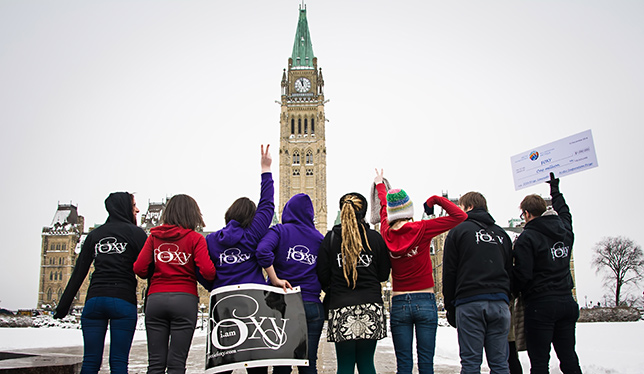Candice Lys will tell you she always knew that FOXY, an arts-based sexual-health education program for young women in the North, was a million-dollar idea. It’s just that now the FOXY founder and executive director has the oversize novelty cheque to prove it.
In December, FOXY was the sole winner of the $1-million Arctic Inspiration Prize, which recognizes up to five organizations a year that work to address pressing issues facing the Canadian Arctic. It’s the first time since the “Nobel of the North” was launched in 2012 that the prize money has gone to a single laureate.
Ms. Lys came up with the idea for FOXY (an acronym for Fostering Open eXpression among Youth) in 2012 as part of her PhD research at the University of Toronto’s Dalla Lana School of Public Health. She knew her research would focus on the sexual health of young women in the North and that she wanted to create something that made a real-world impact.

“I find that a lot of PhD research … gets done then it sits on a shelf somewhere. I wanted to actually do something that I felt really made a difference in my home community,” says Ms. Lys, now in her fifth year of her PhD program.
With the help of friend and FOXY co-founder Nancy MacNeill, Ms. Lys aimed to overhaul the typical sex-ed curriculum by creating a sexual health and leadership program that was interactive and adaptable, and encouraged honest conversations about sex, relationships, self-care and self-awareness through artistic expression including drawing, painting, photography, drama and music.
“I really believe in the process of using the arts,” says Ms. Lys. “I think it’s much more important than the product that’s produced. Being able to follow something through from start to end and to be proud of it, regardless of what it actually looks like … is a great method for learning, particularly for people who might not connect to the more formal classroom.”
These art pieces later became a launching point for research. “It’s a way of looking at the social determinants of health without asking questions like, ‘How much money do your parents make?’ – the kind of things that teenagers won’t know about. Through conversations, issues like social-economic status come out,” says Ms. Lys. She has interviewed 47 former FOXY workshop participants and is now in the process of analyzing the data – a process that’s taken more time than expected now that FOXY has become a huge success.
In just two years, Ms. Lys and Ms. MacNeill have expanded FOXY from a two-person pilot project in small-town Northwest Territories, to a registered not-for-profit organization with a staff of five that has put on 40 workshops in 20 communities across the territory and a pair of nine-day peer-leader retreats for about 50 youth (the training qualifies as a high school credit). Ms. Lys figures that to date FOXY has worked with more than 500 young women in Canada’s North.
She credits the program’s rapid growth to the region’s appetite for relatable, effective sexual health education. “I don’t think that the sexual health education system that we had before was meeting the needs of Northerners and its communities,” she says. It helps that she’s a born and bred Northerner and Métis woman herself. “That’s what [the community] wanted: Northerners who are here for the long-run. Here we often see teachers or nurses who come into the community for a year, two years, or three years and they do a great job while they’re here, but then they’re gone. It’s all about creating Northern-led, Northern-driven, sustainable programming.”
Ms. Lys and the FOXY team have big plans for their recent monetary windfall. First, they’ll expand their mandate to include youth of all genders across the three territories. In the long-term, they plan to ramp up their efforts in rural communities across Canada because, as Ms. Lys says, the need for this kind of sexual health education isn’t “a Northern thing” so much as “a small-town thing.” In terms of research, Ms. Lys and company have begun looking into the social and structural factors influencing sexual health for LGBTQ youth and they’ve even hired FOXY peer leaders to work as research assistants.